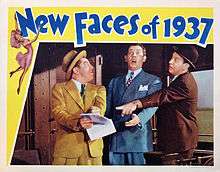New Faces of 1937
| New Faces of 1937 | |
|---|---|
 Lobby card to New Faces of 1937 | |
| Directed by |
Leigh Jason James Anderson (assistant) |
| Produced by | Edward Small |
| Written by |
Story: George Bradshaw ("Shoestring") Sketch: David Freedman ("A Day at the Brokers") Adaptation: Harold Kussell Harry Clork Howard J. Green Screenplay: Nat Perrin Philip G. Epstein Irv S. Brecher |
| Starring |
Joe Penner Milton Berle Parkyakarkus Harriet Hilliard William Brady Jerome Cowan Thelma Leeds |
| Music by | Roy Webb |
| Cinematography | J. Roy Hunt |
| Edited by | George Crone |
Production company | |
| Distributed by |
RKO Radio Pictures (1937) (USA) (theatrical) C&C Television Corporation (1955) (USA) (TV) RKO Home Video (USA) (video) (laserdisc) |
Release dates |
|
Running time | 100 minutes |
| Country | United States |
| Language | English |
| Budget | $728,000[1] |
| Box office | $775,000[1] |
New Faces of 1937 is a black and white 1937 American musical film. Its plot is similar to The Producers (1968).
Plot
A crooked theatrical producer deliberately sets about creating an unsuccessful show after selling more than 100% of it to investors.
Cast
- Joe Penner - Seymore Seymore
- Milton Berle - Wallington 'Wally' Wedge
- Parkyakarkus - Parky
- Harriet Hilliard - Patricia 'Pat' Harrington
- William Brady - James 'Jimmy' Thompson
- Jerome Cowan - Robert Hunt
- Thelma Leeds - Elaine Dorset
- Lorraine Krueger - Suzy
- Tommy Mack - Judge Hugo Straight, Conductor
- Bert Gordon - Count Mischa Moody
- Patricia Wilder - Pat, Hunt's Secretary
- Richard Lane - Harry Barnes, Broker
- Dudley Clements - Plunkett, Stage Manager
- William Corson - Assistant Stage Manager
- George Rosener - Peter, Stage Doorman
- Dewey Robinson - Joe Guzzola
- Harry C. Bradley - Count Moody's Secretary
Production
An alternate title for this film, which was in production from late March to mid-May 1937, had been listed as Young People. Singer Rene Stone, who appears in the film, was discovered by Edward Small singing while cleaning dishes in a Manhattan restaurant.[2]
Soundtrack
- "New Faces"
- (1937)
- Music and Lyrics by Charles Henderson
- Played during the opening credits
- Sung and danced by showgirls (including The Brian Sisters) and showboys to open the final show
- Danced by Ann Miller
- Sung by Harriet Hilliard and showgirls
- "The Widow in Lace"
- (1937)
- Music by Harold Spina
- Lyrics by Walter Bullock
- Sung by Thelma Leeds and showgirls at rehearsal
- Played and danced by unidentified children, probably The Loria Brothers
- "Our Penthouse on Third Avenue"
- (1937)
- Music by Sammy Fain
- Lyrics by Lew Brown
- Played on piano by Harriet Hilliard and sung by her and William Brady
- "It Goes to Your Feet"
- (1937)
- Music by Sammy Fain
- Lyrics by Lew Brown
- Played and sung by Eddie Rio and Brothers
- Danced by Lowe, Hite and Stanley act, with Lorraine Krueger
- "If I Didn't Have You"
- (1937)
- Music by Sammy Fain
- Lyrics by Lew Brown
- Sung by Harriet Hilliard and William Brady
- "Love Is Never Out of Season"
- (1937)
- Music by Sammy Fain
- Lyrics by Lew Brown
- Sung by William Brady and danced by Harriet Hilliard and male chorus
- "When the Berry Blossoms Bloom"
- (1937)
- Written by Joe Penner and Hal Raynor
- Sung and danced by Joe Penner in the show
- "Peckin'"
- (1936)
- Music and Lyrics by Ben Pollack and Harry James
- Additional lyrics by Eddie Cherkose (1937)
- Sung and danced by The Three Chocolateers, The Four Playboys and chorus in the big finale in the show
- "Bridal Chorus (Here Comes the Bride)"
- (uncredited)
- from "Lohengrin"
- Music by Richard Wagner
- Swing version in the song "Peckin'"
- "The Wedding March"
- (uncredited)
- from "A Midsummer Night's Dream, Op.61"
- Music by Felix Mendelssohn-Bartholdy
- Swing version in the song "Peckin'"
Reception
The film recorded a loss of $258,000.[1] Reviews were mixed.[3][4]
The film was meant to be the first in a series of musical revues designed to introduce new RKO talent, but this did not eventuate. Film writers Richard B. Jewell and Vernon Harbin wrote that:
Containing not a single memorable musical number or inspired comedy routine, this tedious mish-mash caused the studio embarrassment a-plenty. Theatre owners and audiences displayed such hostility towards the Edward Small production in general, and Penner and Parkyakaras in particular, that RKO cancelled plans to make a New Faces of 1938.[5]
References
- 1 2 3 Richard Jewel, 'RKO Film Grosses: 1931-1951', Historical Journal of Film Radio and Television, Vol 14 No 1, 1994 p57
- ↑ Around and About in Hollywood Read, Kendall. Los Angeles Times (1923-Current File) [Los Angeles, Calif] 18 May 1937: 10.
- ↑ THE THEATRE: Top Summer Fare Wall Street Journal (1923 - Current file) [New York, N.Y] 02 July 1937: 13.
- ↑ THE SCREEN: A Suspicious Glance at 'New Faces of 1937,' at the Music Hall-New Films at Rialto and Palace At the Rialto By FRANK S. NUGENT. New York Times (1923-Current file) [New York, N.Y] 02 July 1937: 25.
- ↑ Richard B. Jewell & Vernon Harbin, The RKO Story, Octopus 1984 p 108
External links
- New Faces of 1937 at the Internet Movie Database
- New Faces of 1937 at the American Film Institute Catalog
- New Faces of 1937 at The New York Times
- New Faces of 1937 at Answers.com
- New Faces of 1937 at Flixster
- New Faces of 1937 at the TCM Movie Database
- "Wanna Buy a Duck?" New Faces of 1937, by Craig Hodgkins